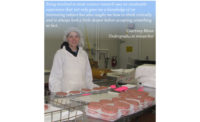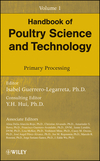The University of Florida’s Department of Animal Sciences faculty works closely with industry groups including several livestock associations, Florida Farm Bureau, and others to develop educational programs for their members. Schools, institutes, demonstrations, short courses, and field days are some of the activities resulting from the programs. Extension activities are viewed as a responsibility of the entire department, and faculty contributes to these activities. The Department of Animal Sciences Meat Science Research program is regularly supported by grants from the Florida Beef Council. The meats faculty partners with faculty at Florida A&M University and other departments to cooperate in research.
The meats research efforts address the needs of the Florida producer and meat industry, with projects dealing with beef, quality of crossbred carcasses and meat processing. Dr. Chad Carr and Dr. Dwain Johnson, professors in the Department of Animal Sciences, recently submitted a proposal to Adena Meats on validating the shelf life of fresh ground beef. The objectives of the research proposal were to quantify the color, shelf-life, and microbial soundness of ground beef subjected to industry standard dark storage and aerobic overwrap packaging.
Graduate students in the department are greatly involved in research efforts as well. One of these efforts was to determine if quantifying loin quality is an effective means to stratify ham quality differences and ultimately optimize quality for both processors and consumers.
Another study conducted by Dr. Dwain Johnson was the influence of Brahman genetics on beef carcass and palatability traits within a multibreed herd. This long-term study has been ongoing since 1989. The data set from this study provides a platform for the new faculty to explore tenderness and provide a more consistent eating experience for tropically adapted animals that must be utilized in environments such as Florida.
The department has recently expanded and diversified by new faculty hires, Drs. Tracy and Jason Scheffler. Both are trained as basic scientists but have excellent applied backgrounds in animal agriculture. Tracy has predominantly worked in early postmortem muscle metabolism, and Jason has worked with fat deposition in both cattle and pigs. Both Dr. Schefflers’ will be involved in research with the unique multibreed herd.
The department engages students in courses that will help to further develop their career in the agriculture industry. During the summer of 2014, the undergraduate consumer education course “The Meat We Eat,” which has been taught on campus at the University of Florida for over 40 consecutive spring and fall semesters, was taught as a Massive Open Online Course to over 20,700 people from 169 different countries enrolled via the Coursera platform. Lectures covered all aspects of muscle foods production, processing, preparation, cooking and storage. Other consumer-based courses offered include Meats, Meat Processing, Meat Selection and Grading, and Livestock and Meat Evaluation.
The department faculty makes lasting impressions on both current and former students. Molly McAdams, President of Om3 and University of Florida graduate, credits all of her success to the Department of Animal Sciences at UF. She expresses that the professors in the department are “very caring about our [students] success; they always challenged me to do something harder than I thought I could do.”










